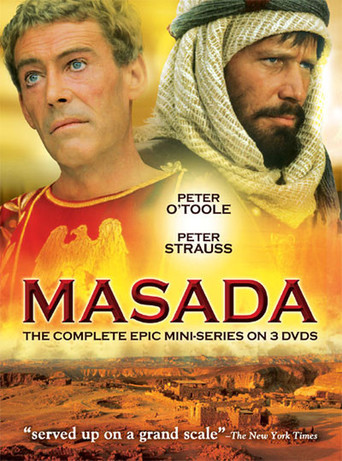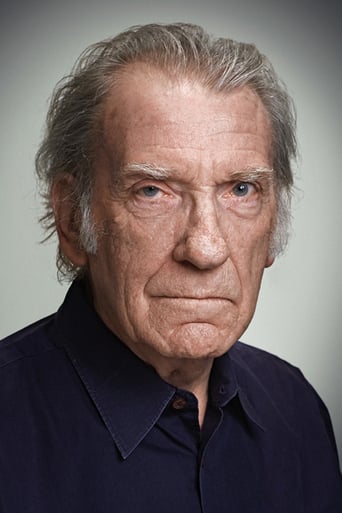

Masada (1981)
After the destruction of the Second Temple, 900 Jewish zealots hold out against a 5000 man Roman legion on the mountaintop fortress of Masada.
Watch Trailer
Cast
Reviews
People are voting emotionally.
Memorable, crazy movie
Wow! What a bizarre film! Unfortunately the few funny moments there were were quite overshadowed by it's completely weird and random vibe throughout.
Strong acting helps the film overcome an uncertain premise and create characters that hold our attention absolutely.
If you're watching this in the early years of the 21st century, and you've been part of or watched 1/2 the history of the 20th, be prepared for a bad case of the willies.Spoiler alert (some reference to field action): Soldiers pushing into olive groves. Farmers and children with no weapon but stones. Military units champing at the bit to go home. Resistance refusing to give up, and even the children setting traps for the occupiers. Here we go again.Those of you from the '70's will see the burning and scattered thatch and think of the Zippo Wars.More up to date than ever. And Peter O'Toole in one of his most magnificent turns as the commanding general of the tenth legion. The rest of the cast puts in superb performances. Nobody phoned it in.Timothy West makes a wonderful Vespasian.Only one question: why didn't O'Toole receive the reward for Best Actor?Accuracy of costume complete, right down to the lack of stirrups on the saddles. The Romans never had 'em.
Masada is an average epic that has been treated generously. It's not horrible, but it could have been better. A good review must look at, aside from the basics, the film's themes, symbolism, and the quality of the plot. The film is inaccurate, but why? What is the film's message? And does the film's message and inaccuracy make it worth buying, renting, or ignoring? But first, the basics. The plot is simple: good guys versus bad guys. No clever twists, except in the end perhaps, and nothing original for its time. The setting is the Jewish Revolt of 66-74 AD. The Romans have just captured Jerusalem, but a handful of zealous freedom fighters escape to the fortress Masada. It is a spectacle in the mold of Spartacus and Ben-Hur, one of the last films of that style. The plot unfolds well but is not engaging or intellectual. Romance is included in the film between the Roman general Silva (O' Toole) and a Jewish whore. It was unnecessary.The acting is mixed. Americans were cast to play the underdogs, the Jews, and Englishmen were cast to play the Romans. As a result talent was concentrated on the Roman side which made for uneven cinema. Peter Strauss who played the Jewish leader is an exception, but the rest were nonentities. On the Roman side there were veteran British actors of tremendous quality such as Peter O'Toole (who occasionally overacts), Anthony Quayle, and David Warner. O'Toole is a real actor. He has actually gotten on stage and performed Shakespeare. In other words the bad guys are not cardboard stands, unlike Star Wars for example. However, the film is heavily biased in favor of the Jews. The film is poor history, but good propaganda. Becket and Lawrence of Arabia were epics that had good history but were still enjoyable. Masada is nowhere near their caliber. Issues have been raised about the mediocre costume and armor of the characters. In my opinion this is a non-issue, there are far more important problems with the film, and that is coming from a Roman military historian. If the film had a better script it would have been a better film regardless of what armor the Roman legionaries wore. Masada and the film's message should be placed into context. The Jews had religious freedom in the Empire, and this is indicated in several passages of Josephus, a Jewish historian (14.228, 1.194, 14.213-16, 14.225-7, 16.162-5). Roman procurators in Judaea also attempted to accommodate Jewish custom, especially towards Jerusalem and the Temple. What the Romans would not give was political freedom. But that status was true for all of Rome's subjects, and only some Jews actively sought independence. I say "some Jews" because the desire for violent resistance against Rome was not universal. There were, however, a number of self-proclaimed messiahs that were stirring up the masses. The film's message is that it is better to die on your feet than to live on your knees. The Jews bravely (or foolhardily) attempted to throw off Roman yoke and suffered horribly as a result. A better philosophy is to live on your feet than to die on your knees, as the rest of Rome's subjects did. The film does not discuss this complicated dilemma, as I said it is anything but original. The Jews did not stand a chance. Whatever one thinks of the Romans they produced a superb fighting machine. Opposition against it was largely futile, or extremely costly, as the Germans learned earlier in the century.The film is neither creative nor enlightening. The goal of propaganda is not to be truthful. The film is Israeli propaganda. The cast and production were American and British, Israel is America's most important ally in the Middle East, and the film had complete support from the Israeli government. At the beginning and end of the film it shows Israeli soldiers climbing Masada, raising Israel's flag, and claiming Masada will never fall again. Did the Romans only represent Romans? Of course not, just as Jurassic Park was a not movie about dinosaurs. The Jews faced a vastly superior force in the 66-74 revolt against Rome. This was also true for the Israeli Defense Force in 1948-9 against the coalition of Arab states. It is symbolism, but unimaginative. It is highly melodramatic. Silva is also overly sympathetic to the Jewish cause, and there is no evidence that he an Eleazar had any sort of contact.The film is historically inaccurate, about 3/4s of it. This is also not surprising. It was based off a fictional novel and not the ancient authorities. It perpetuates the national myth that Masada was garrisoned by the Zealots. It was not, it was garrisoned by Sicarii. The Sicarii were terrorists, or freedom-fighters, depending on your perspective. They murdered 700 women and children at Engaddi (4.7.1). They actively murdered and plundered the property of Jews that accepted Roman rule (7.8.1). These tactics are used by the modern terrorist groups of Hamas, PLO and others against the Israelis. The same is true for insurgents against the U.S. occupation in Iraq. So are these people freedom-fighters and heroes as well? Another interesting dilemma that the film could have explored but did not, for obvious reasons. If you asked the Palestinians, who are held in an economic stranglehold by Israel, the new Romans are ironically the Israelis. The Sicarii most resemble the Kach party in modern Israel, the criminal, antidemocratic, racist party that wants all Arabs expelled from Israel.The film was released in 1981, the same year Israeli aircraft destroyed a multi-story apartment block that contained PLO. The attack killed around 300 civilians and resulted in worldwide condemnation and U.S. embargo on aircraft to Israel. Thus governments can also be terrorist groups. To return to Masada, I own the film because I enjoy watching the Roman army in action. That is the only reason why I own it.
**Spoiler Warning** This series was very informative and spellbinding. It gave me insight to the Romans' technological abilities, for example, the assault tower which could be adjusted to tilt straight up while being drawn up the ramp.The engineer who designed it would have been quite at home in the US Army Corps of Engineers, in terms of using science and engineering know-how to accomplish military objectives. His dying words included vital information about the moon, reminiscent of D-Day being planned for the right tides and moonlighting for the Normandy assault.One person commented about the zealots blowing a good deal. This is the nature of zealots: to want it all, or at least to have more than they now have. The zealots didn't want Rome in their land at all, not now, not when Christ came (Judas Iscariot was a zealot). Eleazar was willing to cooperate with Rome, asking for home-rule during his hillside late-night meeting with Silva. Silva could not get the Caesar to agree.It must have been galling, when Silva was sitting in with the Senate, to have critical questions asked about him but he could not speak to them because he was a guest, not a member of that legislature.I eagerly await this series' uncut release onto DVD for Region 1. I don't have the VHS, simply because I expect a DVD release. If the miniseries "The Martian Chronicles", "V" and such merit a DVD release, then the true history of "Masada" is at least ten times worthier.
Peter O'Toole and Peter Strauss were both great. This is probably one of O'Toole's better performances. Great story, excellent cast, spectacular locations, great performances from Barbara Carrera, Anthony Quayle, and David Warner. This mini-series is definitely well worth your time. This is based on the book, The Antagonists, by Ernest K. Gann. I read it, and the "sequel", The Triumph. Read both books, if you can find them. The Triumph is the story of Flavius Silva after Masada. Almost as entertaining as the movie.


